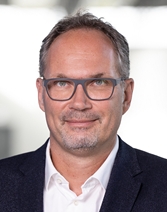CogniGron Seminar by Christian Wenger on "Towards Neuromorphic Computing With HfO2 Based Memristive Devices"

Seminar abstract
Due to its advantages of massive parallelism, high energy efficiency, and cognitive functions, brain-inspired neuromorphic computing is attracting immense interest. As the basic unit cell for learning algorithms, the implementation of synaptic behavior into memristive devices is the key step toward neuromorphic computing.
Recent advances in the performance of resistive random access memory (RRAM) acting as memristive devices have led to a significant interest in neuromorphic applications. Although RRAM based memory arrays demonstrated excellent performance parameters, the variability is still a critical issue. Controlling this intrinsic phenomenon requires employing program-verify schemes. In this talk, an optimized scheme to minimize resistance state dispersion and to achieve reliable multi-bit operation is evaluated.
Nevertheless, there is still a huge gap between the physical implementation and the verification of circuits and systems proposed for memristive devices. The first step, required to fill the gap, is the development of analog simulation tools, which are the base for the successful implementation of digital CMOS circuits with memristive elements. New designs and concepts need to be supported up by physical implementation and verification to be reliable. That means, new simulation tools for memristive devices have to address the following issues: device variability, cycling variability, data endurance, data retention as well as device switching speed. Meaning that memristive device models still have a long way to be completed.
About Prof. Christian Wenger
Christian Wenger received the Diploma in physics from the University of Konstanz, in 1995 and the Ph.D. degree from the Technical University of Dresden, in 2000. Since 2002, he has been with IHP – Leibniz institute for high performance microelectronics, where he works in the field of device and materials innovations for microelectronics.In 2009, he received the post-doctoral degree at TU Dresden. He has authored and co-authored more than 150 papers and holds 6 patents. 2018, he received the professorship “Microelectronics for medical engineering” at Brandenburg Medical School Theodor Fontane. In 2020, he received the professorship “Semiconductor materials” at BTU-Cottbus-Senftenberg and is leading the department “Materials Research” at IHP.
